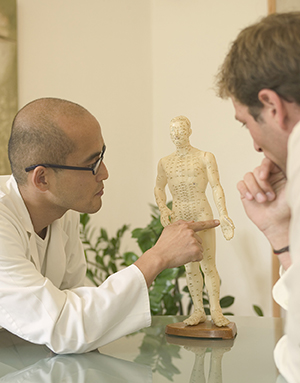Acupuncture
Acupuncture
Acupuncture is an ancient form of Traditional Chinese Medicine (TCM). Behind this treatment is the belief that energy, also known as "Qi," flows through the body. It is thought that health is optimized when the flow of life energy is balanced.
Improved energy flow
Acupuncturists focus on a vital energy called Qi (pronounced "chee"). They believe that Qi flows through a complex network of pathways (also referred to as meridians or channels). Thin needles are inserted into the body at precise locations called acupoints. This is thought to help the body unblock channels and improve the flow of Qi. Depending on which acupoint is targeted, the health effect may be different. In some cases, certain herbs are burned in a controlled manner near or over an acupoint. Using herbs in this manner is called moxibustion.
Acupuncturists are trained to spot problems with Qi flow early to prevent future problems. They may do this by asking health questions, checking your pulse at the wrist, and by looking at your tongue. Using this diagnostic process helps them locate a problem sometimes even before you can tell that something is wrong.
Why seek this care?
The National Institutes of Health (NIH), as well as the World Health Organization (WHO), has said that acupuncture may be helpful for treating certain conditions. These include addiction withdrawal, pain, nausea, hay fever, high blood pressure, and various other health problems. Acupuncturists will often treat an even wider range of conditions. For instance, acupuncture may be done to treat anxiety disorders or depression, digestive problems, headaches, and much more.
Questions for the acupuncturist
Before you decide whether to have acupuncture to treat a health problem, talk with an acupuncturist. Asking him or her some of these questions may help you make an informed decision:
What is your training? How long have you been practicing?
What risks do I need to know about?
Have you treated problems like mine?
What will a typical visit be like?
Do you use disposable needles?
Will I feel the needles?
How long will treatment take and how much will it cost?
Will my insurance pay for your services?
Resources
Research acupuncture in your local library, on the Internet, or by contacting:
American Association of Acupuncture and Oriental Medicine
www.aaaomonline.orgNational Certification Commission for Acupuncture and Oriental Medicine
www.nccaom.orgAmerican Academy of Medical Acupuncture
www.medicalacupuncture.org
Updated:
May 01, 2017
Reviewed By:
Finke, Amy, RN, BSN,Garilli, Bianca, ND
